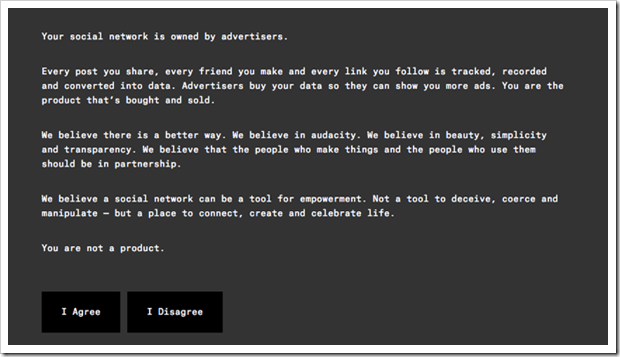Is Ello A Serious Threat To Facebook? Here Is What We Think
Contents
“For men may come and men may go
But I go on forever.”
– Alfred Lord Tennyson
The one person who can actually sing it today is perhaps Mark Zuckerberg
Social sites have sprung up, stayed around for a while. And then vanished without leaving behind a trace.
Ello, which has been making waves with the net savvy people and social media freaks since the last few days, looks like another of these many come-and-go sites.
Some of them looked quite promising and had a wow factor to begin with but fizzled out eventually.
App.net, for example.
It was a brilliant take off on Twitter and allowed users to write much more than the 140 characters Twitter restricts them to. And, it was ad free. But for reasons best known to them (could be poor marketing, reluctance on the part of Twitter users to move on to a newer service, even if it looks better, etc.), App.net relieved all its full time employees some time back. Not enough subscriber base, perhaps.
Orkut, which was forsaken by many after Facebook appeared on the scene in 2005, winded off today completely after having been around for many years.
Path, another ad-free social site which was built from a mobile app, boasts of a 5 million strong subscriber base but never has it been seen as a threat or an alternative to Facebook.
Diaspora is another network which even managed to raise a whopping $200,000 with a brilliant campaign.
Inspite of these networks being around, there is no questioning the supremacy of Facebook.
Inspite of losing some of its sheen with coming up of cross messengers like WhatsApp, increasing popularity of Pinterest among female users and youngsters logging on to Instagram, Facebook remains the biggest of them all, that too by pretty big margin.
How is Ello different from Facebook?
When Paul Budnitz, the 47 year old American developer, first launched Ello six weeks back and pitched himself as ‘the next Facebook’, it did sound like a joke.
But then suddenly, some of the first ones to sign up liked the ad-free interface. With the word-of-mouth publicity helping Ello, it soon started gaining popularity. Partly because Facebook has had a tumultuous and a very forgettable summer, with the networking giant coming under a lot of flak for manipulating the News Feeds of nearly 700,000 users as part of a study it conducted along with a couple universities.
Hardly a month had passed before the customers again cried foul when it began forcing customers to download a second application to their mobile devices in order to message with friends. Add to it the fears over the broad access to data the app asked for on their phones.

Keeping all that in mind, Budnitz came up with something that was remarkably and noticeably different. When he started working on the idea in January, he wanted to provide a platform that offered a way to keep up with a select group of people, with no annoying ads and no intrusion of privacy.
“To me personally, to those who created this network, the Internet has started to suck a bit because people see it as an advertising platform,” Budnitz said in an interview. “We wanted to make the social network we wanted.”
As I logged on to Ello for the first time using an invite my friend had sent over, it looked like a scaled down version of Tumblr which allows users to share pictures and text.
The feed on Ello is categorized into two groups: “Friends” and “Noise”.
And though I did like these categorization because it makes scrolling through the newsfeed much easier than it is on Facebook, the ad-free claim by Ello looked like a façade.
There are no third party ads for sure, but the site is definitely not ad free.
Anyone can sign up for Ello using invites from existing users and they must agree to Ello’s manifesto before they sign up.
I clicked on the button saying I don’t, following which I was led to Facebook!
Ello looks different from Facebook in the sense that it allows users to cloak their privacy. Unlike Facebook, where you must sign u with YOUR name, Ello users do not have to use their real names.
Further, it allows users the option to disable the company’s own analytics software that help run the site.
“Turn off analytics, and you’re totally invisible to us,” said Budnitz. “It’s a first step toward privacy.”
Will Ello be the next Facebook?
After a lukewarm beginning, Ello suddenly started getting noticed as it rallied across the web with the message: “Your social network is owned by advertisers,” while adding that every link, friend and post is tracked and that data is used to help advertisers send you ads.
“You are the product that’s bought and sold.”
Made the perfect pitch! And they were bang on target too.

With more messages and slogans like these, it caught the attention of techies, social media freaks and people who spend a lot of time online. Soon enough, they were getting as many as 35,000 new subscribers every hour.
Now the big question is: Does Ello have the capacity to live upto the initial hype it has managed to create or is it likely to fizzle out like so many more sites?
That seems unlikely, said Kenneth Wisnefski, head of WebiMax, an advertising technology firm. Because all it does as of now is to taps into an undercurrent of dissatisfaction among some of its users. For them, Facebook “lost some of its cool factor,” he said, though it is still ingrained in the daily lives of 829 million people.
Ello is very firm on one thing- YOU, the users, will not be commoditized. Your privacy will not be compromised and your personal information will not be shared.
But then, how will they manage to break even? That, they say, they will achieve by selling its features. By offering to personalize. Users will have to pay if they, for example, wish to change the color scheme, use the mobile app or to have access to business pages though the core features like sharing messages and pictures, commenting, etc will remain free for all.
Whether Ello’s plan to stay afloat by offering premium features to members who are willing to pay for them could help it generate enough revenue to be able to survive without compromising on its ad-free ethos, it still remains to be seen whether they stick to it. If they do manage to create a wide user base, they might change their mind and decide to serve ads.
Just like Facebook, which was not the advertising giant which it is today when it started out.
At present, it is difficult to say whether Ello will emerge as a real threat to Facebook.
It does not look like a possibility. At least, not in the near future.
The reasons
Am I a big Facebook fan?
NO!
And though I do not like the aforementioned too much, I have reason aplenty for disliking what is being served to me as well.
1. No privacy:
Ello hardy has any privacy settings, unlike Facebook. All profiles are public. Anyone can find you and you do not even have the option to block out unwanted people.
2. The UI:
The design of the site or the UI leaves a lot to be desired.
It does not look like a full-fledged site at all.
I had to hunt for friends or people I know on Ello by asking them if they what their Ello names are.
A big thumbs down.
3. The paid mobile app
What the heck! With even leading blogs and websites running free mobile apps, these people wish to charge for the mobile version.
That’s crazy.
If I have to pay to sign on to a social site on my cellphone, I can say confidently that the project is doomed.
4. Biting the bait later.
We, as users, have every reason to believe that Ello will, sooner or later, take the bait and start serving ads just like Facebook and tumblr did.
5. How, on Earth, is it different?
I am already on Facebook. I use Pinterest as my scrapbook, and I love it! I’m using Twitter as my news source. Google+ for promotion. Tumblr as my creative outlet. Instagram as my photo sharing platform.
Do I need another site? Are they offering me anything new or different?
NO!
Conclusion
Ello is still in its beta stage and they are grappling with lots of bugs, have been down to a DDOS attack already.
It is too early to say whether Budnitz’s idea was a brilliant piece of genius or just a flash in the pan.
All we know for now is that it is time for Zuckerberg to realize that people are unhappy with him. And to begin working on it.
If you have plenty of time to kill, go ahead and check out Ello!

Zuckerberg is already on his way to make some changes for betterment of Facebook and he’s has been pretty successful in it. Let’s check out about this new site Ello; anyways thanks for sharing updates about it.
But why is everyone against ads. End of the day business needs to make money. Running an infrastructure like FB or Ello is extremely costly. Someone somewhere is paying. Even trak.in has ads. I dont mind them and i dont mind clicking an ad everytime i read an article. They are doing a good job and they deserve revenue.
Brilliant review. I had heard the buzz, but never read there ‘manifesto’ ! I dont remember any other social network ever creating such document.